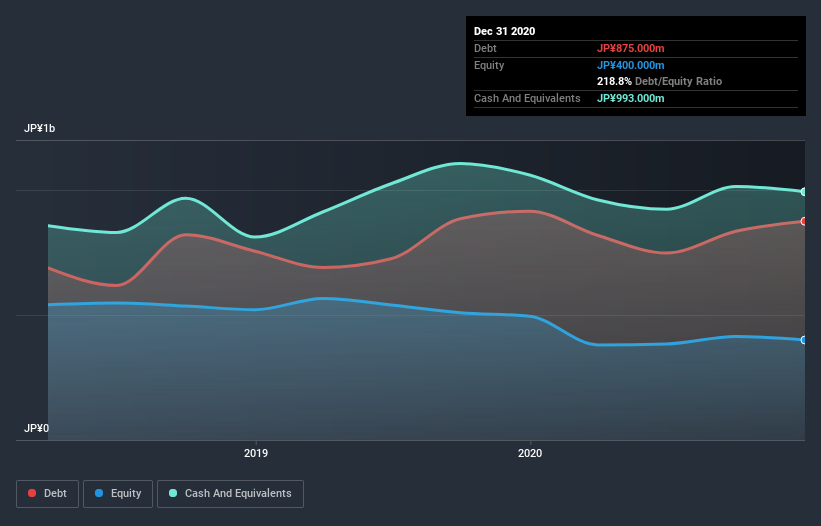
Some say volatility, rather than debt, is the best way to think about risk as an investor, but Warren Buffett famously said that 'Volatility is far from synonymous with risk.' When we think about how risky a company is, we always like to look at its use of debt, since debt overload can lead to ruin. As with many other companies AVIX,Inc. (TYO:7836) makes use of debt. But is this debt a concern to shareholders?
What Risk Does Debt Bring?
Debt assists a business until the business has trouble paying it off, either with new capital or with free cash flow. Ultimately, if the company can't fulfill its legal obligations to repay debt, shareholders could walk away with nothing. However, a more common (but still painful) scenario is that it has to raise new equity capital at a low price, thus permanently diluting shareholders. By replacing dilution, though, debt can be an extremely good tool for businesses that need capital to invest in growth at high rates of return. The first step when considering a company's debt levels is to consider its cash and debt together.
Check out our latest analysis for AVIXInc
What Is AVIXInc's Net Debt?
The image below, which you can click on for greater detail, shows that AVIXInc had debt of JP¥816.0m at the end of December 2020, a reduction from JP¥915.0m over a year. However, its balance sheet shows it holds JP¥993.0m in cash, so it actually has JP¥177.0m net cash.

A Look At AVIXInc's Liabilities
The latest balance sheet data shows that AVIXInc had liabilities of JP¥395.0m due within a year, and liabilities of JP¥634.0m falling due after that. On the other hand, it had cash of JP¥993.0m and JP¥123.0m worth of receivables due within a year. So it actually has JP¥87.0m more liquid assets than total liabilities.
This surplus suggests that AVIXInc has a conservative balance sheet, and could probably eliminate its debt without much difficulty. Succinctly put, AVIXInc boasts net cash, so it's fair to say it does not have a heavy debt load! There's no doubt that we learn most about debt from the balance sheet. But you can't view debt in total isolation; since AVIXInc will need earnings to service that debt. So when considering debt, it's definitely worth looking at the earnings trend. Click here for an interactive snapshot.
In the last year AVIXInc had a loss before interest and tax, and actually shrunk its revenue by 3.5%, to JP¥898m. We would much prefer see growth.
So How Risky Is AVIXInc?
Statistically speaking companies that lose money are riskier than those that make money. And we do note that AVIXInc had an earnings before interest and tax (EBIT) loss, over the last year. Indeed, in that time it burnt through JP¥69m of cash and made a loss of JP¥146m. But the saving grace is the JP¥177.0m on the balance sheet. That kitty means the company can keep spending for growth for at least two years, at current rates. Even though its balance sheet seems sufficiently liquid, debt always makes us a little nervous if a company doesn't produce free cash flow regularly. The balance sheet is clearly the area to focus on when you are analysing debt. But ultimately, every company can contain risks that exist outside of the balance sheet. For instance, we've identified 3 warning signs for AVIXInc (1 can't be ignored) you should be aware of.
If you're interested in investing in businesses that can grow profits without the burden of debt, then check out this free list of growing businesses that have net cash on the balance sheet.
If you decide to trade AVIXInc, use the lowest-cost* platform that is rated #1 Overall by Barron’s, Interactive Brokers. Trade stocks, options, futures, forex, bonds and funds on 135 markets, all from a single integrated account. Promoted
If you're looking to trade AVIXInc, open an account with the lowest-cost platform trusted by professionals, Interactive Brokers.
With clients in over 200 countries and territories, and access to 160 markets, IBKR lets you trade stocks, options, futures, forex, bonds and funds from a single integrated account.
Enjoy no hidden fees, no account minimums, and FX conversion rates as low as 0.03%, far better than what most brokers offer.
Sponsored ContentNew: Manage All Your Stock Portfolios in One Place
We've created the ultimate portfolio companion for stock investors, and it's free.
• Connect an unlimited number of Portfolios and see your total in one currency
• Be alerted to new Warning Signs or Risks via email or mobile
• Track the Fair Value of your stocks
This article by Simply Wall St is general in nature. It does not constitute a recommendation to buy or sell any stock, and does not take account of your objectives, or your financial situation. We aim to bring you long-term focused analysis driven by fundamental data. Note that our analysis may not factor in the latest price-sensitive company announcements or qualitative material. Simply Wall St has no position in any stocks mentioned.
*Interactive Brokers Rated Lowest Cost Broker by StockBrokers.com Annual Online Review 2020
Have feedback on this article? Concerned about the content? Get in touch with us directly. Alternatively, email editorial-team (at) simplywallst.com.
About TSE:7836
AVIXInc
Develops and sells light emitting diode (LED) display systems in Japan.
Flawless balance sheet with proven track record.
Market Insights
Community Narratives



